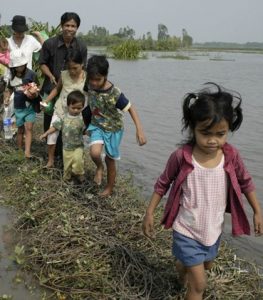Calls for faster action on environmental migration
Migration caused by environmental factors such as floods, droughts and storms will be the focus of a key international meeting this month.
An International Dialogue on Migration (IDM) session hosted by the International Organisation for Migration (IOM) will take place virtually this month following on from previous meetings in 2008 and 2011.
 The meeting’s topic is: “accelerating integrated action on sustainable development: migration, the environment and climate change” and it comes at a time of increasing political urgency, with the impacts of the COVID-19 health crisis linking climate and migration to current and future development issues.
The meeting’s topic is: “accelerating integrated action on sustainable development: migration, the environment and climate change” and it comes at a time of increasing political urgency, with the impacts of the COVID-19 health crisis linking climate and migration to current and future development issues.
Environmental change and disasters have always been major drivers of migration.
But climate change predictions for the 21st century indicate that even more people are expected to be on the move, the IOM says.
“Extreme weather events such as floods, droughts, and storms, become more frequent and intense, and changes in precipitation and temperature patterns impact livelihoods and human security,” the agency said, in a briefing document.
In 2020, 30.7 million people across 149 countries and territories were displaced in the context of disasters, according to the Internal Displacement Monitoring Centre.
And World Bank projections predict an estimated 143 million internal climate migrants by 2050 if no climate action is taken.
COVID-19-related lockdowns and border closures are also affecting people moving in the context of disasters, climate change and environmental degradation and their ability to access income opportunities, the IOM says.
“People can become trapped, not being able to flee disasters or return home following a disaster. Those depending on seasonal migration in the agriculture section, pastoralism or remittances are also affected,” the IOM document says.
The previous IDM meetings identified the areas to be addressed, including data and research, policy development and policy coherence, capacity building, and operational responses.
“Ten years after, in 2021, we are at the moment of accelerating these actions and implementing the commitments made,” said IOM Director General Antonio Vitorino.
“We owe all those affected our full commitment to implement the principles adopted in the Paris Agreement, the Sendai Framework for Disaster Risk Reduction, and the Global Compact for Safe, Orderly and Regular Migration,” he said.
The latest IDM session aims to contribute to the political momentum building towards the 26th Conference of the Parties of the United Nations Framework Convention on Climate Change, taking place in Glasgow in November.
It will also contribute to the preparations for the 2022 International Migration Review Forum (IMRF), which will provide an opportunity for the international community – including both states and non-state partners – to reflect on the progress made in strengthening migration governance through the Global Compact for Safe, Orderly and Regular Migration (GCM).
The IDM discussions will also assess the links among migration, environment, climate change, COVID-19, as well as humanitarian and development issues.
The dialogue will include the views of governments, experts and practitioners and the results and recommendations will be captured in the IDM Red Book, which will be shared broadly with member states and practitioners worldwide.












